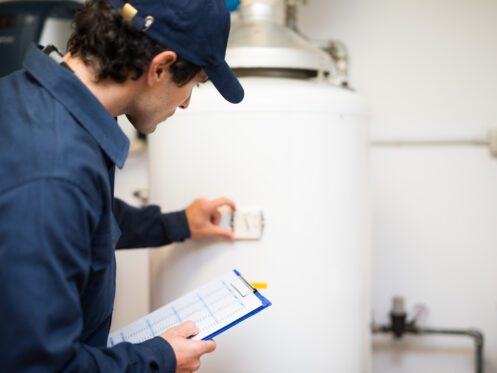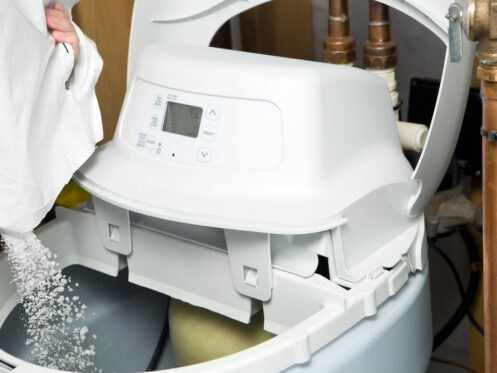Regular water heater maintenance extends the lifespans of these important appliances. It also promotes safe and efficient operation. With routine maintenance, you can protect your hot water’s quality, save money, and stave off the need for premature replacement. Read on to discover the best schedule for servicing the water heater in your Jacksonville, FL home and why.
Water Heater Manufacturers Recommend Annual Maintenance
Whether tankless or storage-based, the manufacturer-recommended schedule for water heater maintenance is once a year. This allows plumbers to inspect sacrificial anode rods, thermostats, shut-off valves, and more. We look for rust and other corrosion, heavy sediment buildup, and structural tank damage. Annual service allows our team to identify and correct minor issues before they become larger and costlier problems. People who neglect yearly water heater maintenance have a much higher likelihood of experiencing messy tank ruptures and leaks than homeowners who stay on top of this essential care.
Water Heater Warranties Require It
All new water heaters come with manufacturer warranties that cover the costs of repairing or replacing these units due to defective components or faulty manufacturing. Most water heater warranties last between six and 12 years, but some companies offer 10-year conditional replacement warranties.
To enjoy these benefits, homeowners must remain compliant with the mutually binding terms of their warranty agreements. Manufacturers’ warranties stipulate that these products must have the proper specifications for their intended applications, be professionally installed, and receive professional repairs. More importantly, all warranted water heaters must receive professional maintenance service at least once each year. If you submit a repair request for a warrantied issue, evidence of insufficient maintenance or no maintenance at all could result in a frustrating claim denial.
You will also need to consider the requirements for water heater maintenance that exist in your home insurance policy or your home warranty agreement. After all, your insurance company might not pay for water damage repairs if your water heater ruptures due to insufficient maintenance.
What Does Annual Water Heater Maintenance Include?
In addition to performing thorough water heater inspections and replacing sacrificial anode rods, plumbers also flush water heaters out. Flushing removes trapped sediment caused by dissolved minerals in your home’s water supply. These scale buildups weigh heavily on water heater tanks and can eventually cause their glass liners to crack.
Sediment also creates a barrier between water and water heaters’ heating elements. As a result, these appliances must use more energy to heat water and keep it warm in storage. According to the United States Department of Energy (DOE), having an energy-efficient water heater could save homeowners between 8% and 34% on their home energy bills. Annual water heater maintenance will help you enjoy these savings.
Replacing the Sacrificial Anode Rod
In storage-based water heaters, sacrificial anode rods are thin, metal rods that travel the length of tanks. They’re made from highly active metals like zinc and aluminum. These rods attract corroding minerals and corrode themselves to prevent corrosion in water heaters. When sacrificial anode rods are fully corroded, water heaters lose this protection and often rust rapidly.
Sacrificial anode rods wear down fastest in homes with hard water. In Jacksonville, municipal water has between 14 and 28 grains per gallon (GPG) of hard water minerals. According to the Water Quality Association, this is up to three times higher than the GPG measurement for “very hard” water. Thus, although some sources might recommend scheduling water heater maintenance and sacrificial anode rod replacement every one to two years, locals should have these services performed annually. In fact, in Jacksonville, many homeowners are advised to replace their sacrificial anode rods annually and have their tanks flushed every six months.
Testing Connections
Testing water heater connections is a critical part of ensuring the safety and efficacy of these appliances and protecting the surrounding building materials. Loose gaskets, faulty valves, and excess pressure are among the most common causes of leaky connections. Given that storage-based water heaters are often installed in remote and inconspicuous areas, minor leaks can fester unnoticed for months or even years without regular inspections.
These drips can add up over time to result in hundreds of gallons of water waste. Not only will you see this reflected on your water bill, but you’ll also notice a difference in hot water supply and pressure. Hidden water heater leaks can also lead to warped building materials, stubborn mold and mildew problems, and rising indoor humidity.
Common Problems Found During Water Heater Service
In addition to affecting the efficiency of your water heater, developing problems can also impact the taste, smell, and overall quality of water you’re cooking with, bathing in, and consuming. With annual water heater maintenance, plumbers can make sure that common issues aren’t negatively impacting your water safety.
Discoloration
When draining your tank and flushing it, we’ll look for evidence of green or brown-tinged water. This can indicate large amounts of sediment. As needed, we’ll also check the color of the hot water coming from your taps. It may be time to have your water heater flushed or replaced, or you may have problems with corrosion in other areas of your plumbing system.
Plastic Particulates
Your water heater has a white, plastic tube attached to its cold water inlet. This tube dips down into the hot water stored inside your tank where it deposits fresh water supplies as hot water exits. Over time, constant expansion and contraction caused by temperature changes causes dip tubes to warp and crack. If we find white plastic particles at the base of your water heater’s tank during maintenance service, we can replace your dip tube or recommend water heater replacement as needed.
Pressure Relief Valve Failure
As their name implies, pressure relief valves relieve excess pressure in water heater tanks to prevent tank ruptures and explosions. Although water heater explosions are rare, they can and do occur. The best way to prevent your water heater from spilling its contents on your floors is by having it professionally maintained at least once a year.
Tankless Water Heater Maintenance
While standard, storage-based water heaters last between 10 and 15 years, many tankless models last at least 25 years. Unlike storage-based water heaters, these models don’t heat and hold water for long periods. The on-demand water heating they supply causes less stress and less overall wear. For many households, tankless models are also significantly more efficient.
Notwithstanding these benefits, tankless water heaters still need regular maintenance. Tankless water heater manufacturers recommend scheduling professional maintenance services annually, and tankless water heater warranties require it. These units don’t have sacrificial anode rods that need replacing, but they do need to be flushed. Plumbers use commercial descaling solutions to break down the scale and move it out. We also clean and reseal purge valves and port caps, check and test all connections, and take other measures to ensure safe and efficient performance.
We’ve proudly served Jacksonville, FL and the surrounding communities since 2010. We offer exceptional heating, cooling, air quality, and plumbing services. We also provide smart thermostats, duct sealing, and blown-in insulation. If you need water heater service, get in touch with Buehler Air Conditioning & Plumbing today!




